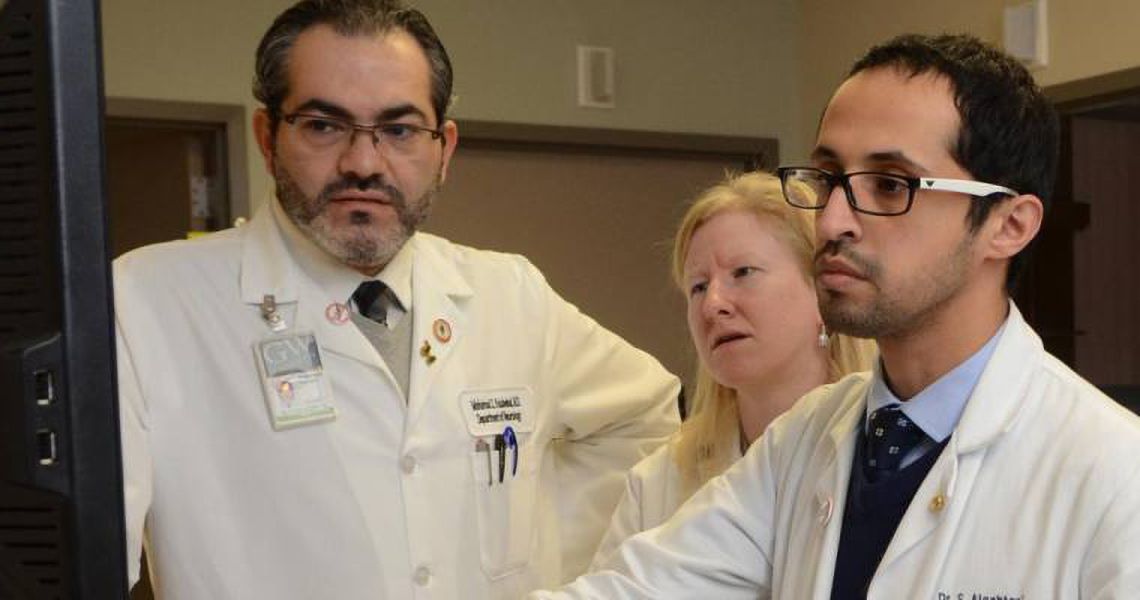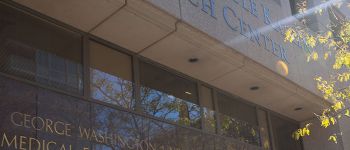Epilepsy Center
Make a New Patient Appointment:
Call 202-823-4165

Services We Offer & Conditions We Treat:
- Services We Offer:
-
- Level IV Epilepsy Center
- EEG: - Ambulatory at home EEG monitoring
- Routine EEG
- Non-invasive imaging technology
- Surgical therapies
- Laser ablation surgery or LITT
- Implantable Devices
- Focal resection surgeries
- Corpus Callostomy
- Multiple Subpial Transection (MST)
- Diet clinic
- Neuropsychological testing
Our Epilepsy Specialists Are Your Assurance of Excellent Care in Washington, DC
The specialists at The Epilepsy Center at The GW Medical Faculty Associates understand treatments should also be personalized. To accurately and effectively make a diagnosis, The Epilepsy Center provides inpatient and outpatient facilities equipped with imaging and electroencephalogram (EEG) technologies to map out the locations of abnormal brain activity. The Center also offers 24-hour video-EEG monitoring of seizures, so patients can quickly receive a diagnosis and begin treatment.

Why choose The Epilepsy Center at GW? Advanced Diagnosis, Treatment & Care
- Level IV Epilepsy Center as designated by the National Association of Epilepsy Centers.
Being the largest program in the area, we offer great access to care and the highest level of diagnostic abilities and treatment options to eliminate or stabilize seizures. For more information, visit the GW Hospital Level IV Epilepsy Center page. - Expertise of an academic based, comprehensive, specialized center.
Medical schools and teaching hospitals educate the next generation of physicians, conduct cutting edge research and often care for the sickest and most complex patients. National studies show that patients fare better at academic medical centers. - Advanced and personalized seizure control.
No two epilepsy patients are alike - the type, severity and frequency of seizures are as different as the triggers. Our specialists address the unique needs of special populations with epilepsy, like women and patients transitioning from pediatric to adult neurology care. - Access to new research and treatments.
As part of an academic medical university, we have access to clinical trials for testing anticonvulsant drugs and learning about newer or different treatments that may help you. - Neuro-imaging.
The latest in noninvasive imaging technology including higher resolution MRI using specialized protocols for epilepsy. MRI, PET Imaging and multimodal imaging. - Active and experienced surgical program.
Over the years, our experts have been treating thousands of individuals with medically refractory epilepsy and offer the most advanced surgical treatments in the region, including:- Laser ablation surgery or LITT
- Implantable devices – Vagus Nerve Stimulator (VNS), Responsive Neurostimulator (RNS), Deep Brain Stimulator (DBS)
- Focal resection surgeries
- Disconnection surgeries – Corpus Callostomy and Multiple Subpial Transection (MST)
- Epilepsy & Seizures
-
Did You Know?
- Epilepsy is a common neurological condition
- One in 26 people will be diagnosed with epilepsy at some point in their lives
- Epilepsy affects almost 3 million in the U.S. and 65 million individual worldwide
- 150,000 new cases of epilepsy are diagnosed in the United States every year
What Is A Seizure? What Is Epilepsy?
- Normally, the brain cells communicate with one another through electrical activity
- During a Seizure there is abnormal electrical activity causing irregularities in communication between brain cells, which begin to “fire” synchronously
- This abnormal “firing” can result in abnormal body movements, sensations, or behaviors
- Epilepsy or Seizure Disorder is a condition characterized by a tendency to have repeated seizures from various causes
What Causes Seizures?
- There are many reasons why someone can have seizures
- Seizures can occur from any insult to the brain
- Some of the causes are:
- Previous stroke
- Head trauma
- Brain tumor
- Brain infections
- Very high or very low blood sugar
- Genetic tendencies
Your doctor will explain the cause of your seizures in detail
Are There Different Kinds Of Seizures?
- The clinical manifestations of seizures depend on where they arise in the brain
- Seizures can cause unusual sensations of strange smell, visual hallucinations, and brief episodes of staring into space and fidgeting, as well as convulsions
- Based on the type of seizure, patients can be awake or unresponsive during the episodes
- Your doctor will explain all the details about your seizures
Can Other Conditions Look Like Seizures?
- There are many conditions that can be mistaken for seizures and a thorough evaluation will help establish the true diagnosis
- Some of the conditions that mimic seizures are:
- Syncope or fainting
- Migraine
- Transient Ischemic Attack (TIA) or ‘mini-stroke’
Who Makes The Diagnosis?
- A Neurologist will be involved in your care
- An Epileptologist is a Neurologist who specializes in the treatment of epilepsy
- How is Epilepsy Diagnosed
-
How Is The Diagnosis Made?
- detailed medical history will be taken
- A thorough physical examination including neurological examination will be done
- Several tests will be done based on the above information and include:
- EEG (Electroencephalogram): the “brain wave” test: a recording is made of the brain wave patterns which can give valuable information about the type of seizure and where seizures originate
- MRI: imaging of the brain to find out if there are any abnormalities in the brain causing seizures
- Blood tests: to check for any underlying medical condition that maybe contributory
- Other tests: depends on each patient and the type of seizure
What To Do If You Are Diagnosed With Seizures?
- Your doctor will refer you to a Neurologist or an Epileptologist
- Learn more about your condition
- Partner with your doctor to find the best options of treatment for you
- Consider joining a support group
Multidisciplinary Care Team
Our Epilepsy team offers expert, academic-based, personalized, coordinated care with advanced diagnosis and treatment options for Epilepsy and Seizures.
- Epileptologists
- Neurosurgeons
- Psychiatrists
- Radiologists
- Psychologists
- Nurses
- Dieticians
- EEG Technicians
- Social workers
- and many others…
- Treatment Options
-
What Are The Treatment Options?
- The treatment depends on each patient, the type of seizure and other characteristics
- Medications are the first line treatment of epileptic seizures, but there are also other options - your doctor will discuss these in detail
Medications:
- There are about 25 anti-seizure medications available
- The choice of medication will depend on various factors including, among others, seizure type and location, potential interactions between different medications, and other existing conditions that you may have
- All medications have side effects, and your doctor will try to find a regimen that is most tolerable for you
- Special considerations in women and older patients – please ask your doctor
Non-Drug Options (to be considered if medications do not control seizures):
Ketogenic Diet
A doctor might choose a ketogenic diet for patients who respond poorly to medication. On the diet, patients eat foods rich in fats and oils, but low in proteins and carbohydrates. This creates a condition called ketosis in the body, which can help control seizures. However, achieving this reduction requires strict compliance with the diet.Modified Atkins Diet
The modified Atkins diet (often abbreviated in the literature as “MAD”) is a change to the traditional “classic” ketogenic diet to make it less restrictive. Along with the MCT (medium chain triglyceride) diet and LGIT (low glycemic index treatment), it is one of three “alternative diets” used to treat patients with epilepsy.Surgical Options – Neurosurgery
An array of surgical options are available and are based on the location in the brain and types of seizures you may be having.Surgery is a very good option in certain patients and personalized to each patient’s unique needs.
Surgical options may include the following:
- Laser Ablation Surgery or LITT
- Implantable devices
- Focal Resection Surgeries
- Disconnection surgeries – Corpus Callostomy and Multiple Subpial Transection (MST)
- Living With Epilepsy
-
Is There Anything You Can Do To Control Seizures?
- Learn as much as possible about your condition
- Keep track of the frequency of seizures. You can use a calendar or a smartphone app such as seizuretracker.com - Make a note in the diary if you identify something which would have triggered your seizure.
- Ensure that you take the medications as prescribed
- Make sure you get enough rest and sleep
- Make sure other medical conditions are under control
- Avoid drinking alcohol
What Is The Impact Of Seizures On Your Life?
- Until the seizures are controlled, there are limitations to driving. Please check with your local DMV about driving restrictions.
- Your neurologist may advise you to restrict or take special precautions with certain activities.
- Most people with epilepsy will have optimal seizure control and will lead a long and full life, with no limitations on driving or other activities
Remember:
- Epilepsy can be different in each person: some have easily controlled seizures and some have difficult to control seizures
- The goal of treatment for seizures are - No seizures, No side effects
- Ensure that you take medications as prescribed and discuss with your Neurologist any side effects that occur
- Women should discuss contraception, pregnancy and lactation with the Neurologist
- Understand activity restrictions including driving, until seizures are controlled
- Consider wearing a Medic-Alert bracelet.
First Aid For Seizures:
- The most important thing to do is to keep
- the person safe until the seizure stops
- Prevent injuries by clearing the area of any harmful objects
- If possible place the person on the floor in the recovery position
- Place a soft object under the head to protect the head from trauma
- Do not place any objects in the mouth. It is not true that an unconscious person can swallow the tongue.
- Do not try to hold the person down or attempt to stop the movements
Call 911 If:
- The patient has repeated seizures
- The patient does not seem to wake up after a seizure
- If seizure lasts more than 5 minutes
- Epilepsy Monitoring Unit
-
The George Washington University Hospital (GW Hospital) EMU is a specialized inpatient unit designed to evaluate, accurately diagnose and ultimately design the best possible treatment plan for seizure disorders using continuous Video EEG and monitoring. Our EMU team can gather data before a seizure starts, while one is occurring and during recovery. This approach can provide answers about your seizures’ characteristics and help doctors identify the type(s) of seizures and other clues that can shape your treatment.
Our EMU team includes The GW Medical Faculty Associates neurologists, neurosurgeons, nurse specialists, EMU technologists, epilepsy fellows, neurology residents, medical students, psychologists, psychiatrists, case managers and social workers to cover all aspects of your life affected by seizures.
GW Hospital’s Epilepsy Center meets and exceeds guidelines for both fourth level medical and fourth level surgical epilepsy centers, the highest levels set forth by the National Association of Epilepsy Centers.
The length of time a patient may spend in the unit varies, but can range from three to seven days.
For more information, please visit the GW Hospital EMU Center page.
Patient Resources



